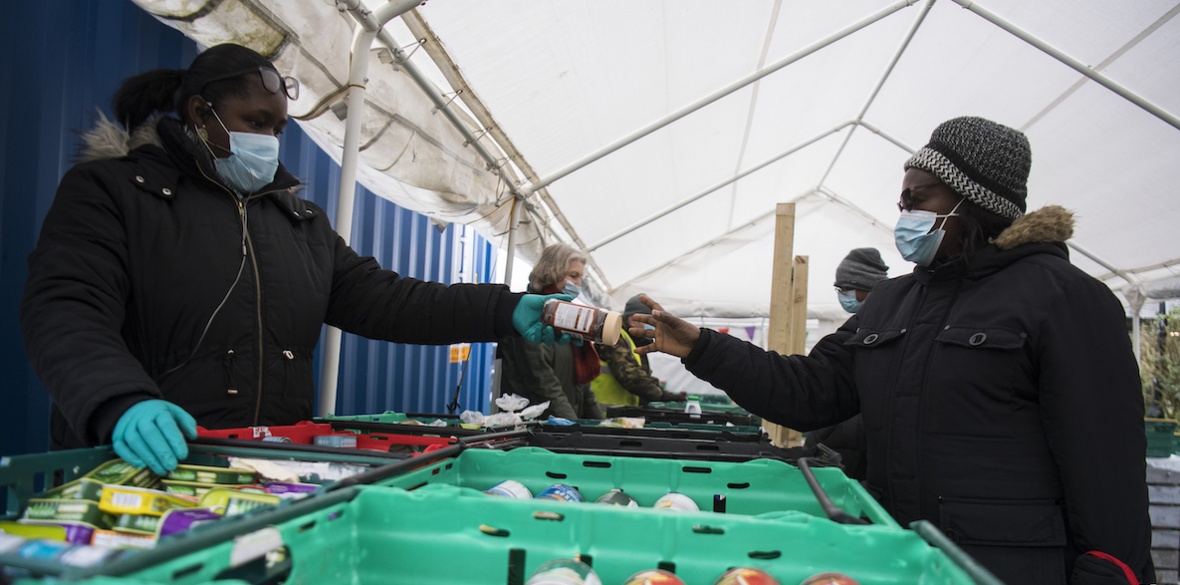This is the last article you can read this month
You can read more article this month
You can read more articles this month
Sorry your limit is up for this month
Reset on:
Please help support the Morning Star by subscribing here
NEVER has there been more of a need for governments in Holyrood and Westminster to take decisive action to ensure that everyone has access to good food.
Ahead of the STUC and TUC upcoming Cost of Living summit and demonstration on June 17 and 18, we are urging them to include the right to good food in their demands as a matter of urgency.
The Larder has been delivering good food with dignity for over five years and in that time have supported families and individuals in West Lothian who have been hungry and in need of good food, in social settings with where they can eat with dignity and choice.
We delivered 140,000 freshly cooked ready meals to over 900 people during Covid.
We continue to deliver 900 meals every week to 300 individuals who are moving from despair to destitution as the cost-of-living crisis starts to take a real grip on those on the lowest incomes.
We see and hear first hand the harrowing stories of parents going without food to feed their children and only this weekend we heard about someone who was burning their furniture to heat their home.
The right to good food is very different from the foodbank model that has become so prevalent as the standard response to food insecurity across Britain.
The right to good food includes choice, a feeling of control and ensures good-quality nutritious food that acknowledges the social value of eating.
Importantly, good food has those who are experiencing food insecurity at its heart, including them in the design, delivery and decision-making of food aid responses.
The number of people experiencing food insecurity is such that this must now be declared a national emergency and the STUC and TUC must make “the right to good food” a key demand from their national activity on June 17 and 18.
Because, make no mistake about it, this is a major crisis in working-class communities. The extent of the crisis can be seen in a series of recent reports.
The Food Foundation reported that the number experiencing food insecurity has jumped by 57 per cent. Some 7.3 million adults are living in households where people have gone without food or could not physically access it.
This means people are going without meals, giving food to other members of their family or are reliant on charitable donations to eat. There are many consequences of this but the mental health impact and feeling of shame and guilt for those affected is tragic and profound.
In another report the National Institute for Economic and Social Research (NIESR) identified another 250,000 households that “will slide into destitution, taking the total number in extreme poverty to around 1.2 million” as the incomes of the poor fail to keep up with soaring inflation, the appalling universal credit cut from Rishi Sunak, and endemic low pay.
This confirms what we already see at The Larder: the number of people struggling to survive is soaring and will get worse unless there is immediate action to stop it. So what do we need to do?
At The Larder, we recognise that foodbanks have played a necessary role in helping to feed hungry people but we have to move away from a charitable model of the deserving and undeserving poor — where often poor-quality food is deemed good enough for poor people — to a system based on dignity, equality of access, social solidarity and mutual support.
This could begin to be developed if we enshrine the right to food in law and fund grassroots community organisations to deliver sustainable food dignity projects in their area. There are plenty of great ideas out there, we just need the support to deliver them.
In the Scottish Parliament, the Good Food Nation Bill is going through the parliamentary process.
This Bill is well-meaning but lacks purpose. The overarching purpose of this Bill should be based on providing every citizen with the right to good food -— it was devastating to see that an amendment to enshrine this right in the Bill was voted down by SNP, Green and Tory MSPs.
But we will not stop campaigning for this change and we have another chance with Rhoda Grant MSP’s member’s Bill, which is based around enshrining this right in law.
Whatever happens, The Larder will continue to do our best to feed people with good food — but we need help, we need the governments in Holyrood and Westminster to work meaningfully and proactively with partners to deliver food dignity.
So let’s see the right to good food become one of the key demands on June 17 and 18, call on the Westminster and the devolved governments to declare a national food emergency — and call for a crisis food summit to plan a national response to the hunger and food insecurity that shames these islands.
Angela Moohan is chief executive of The Larder, a social enterprise that campaigns for good food for all — www.thelarder.org.









